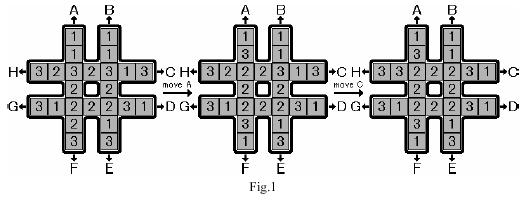[POJ2286]The Rotation Game
阿新 • • 發佈:2018-10-11
剪枝 ... ++ 全局 %d figure sym ati 情況

Initially, the blocks are placed on the board randomly. Your task is to move the blocks so that the eight blocks placed in the center square have the same symbol marked. There is only one type of valid move, which is to rotate one of the four lines, each consisting of seven blocks. That is, six blocks in the line are moved towards the head by one block and the head block is moved to the end of the line. The eight possible moves are marked with capital letters A to H. Figure 1 illustrates two consecutive moves, move A and move C from some initial configuration.
Description
The rotation game uses a # shaped board, which can hold 24 pieces of square blocks (see Fig.1). The blocks are marked with symbols 1, 2 and 3, with exactly 8 pieces of each kind.
Initially, the blocks are placed on the board randomly. Your task is to move the blocks so that the eight blocks placed in the center square have the same symbol marked. There is only one type of valid move, which is to rotate one of the four lines, each consisting of seven blocks. That is, six blocks in the line are moved towards the head by one block and the head block is moved to the end of the line. The eight possible moves are marked with capital letters A to H. Figure 1 illustrates two consecutive moves, move A and move C from some initial configuration.
Input
Output
Sample Input
1 1 1 1 3 2 3 2 3 1 3 2 2 3 1 2 2 2 3 1 2 1 3 3 1 1 1 1 1 1 1 1 2 2 2 2 2 2 2 2 3 3 3 3 3 3 3 3 0
Sample Output
AC 2 DDHH 2
日常吐槽:調了半天玄學錯誤,最後發現我遞歸的時候修改了全局變量的值...這個錯誤調了我大概一個小時...
哎還是太菜了,要加油啊。
然後過了樣例提交,WA,改了改某些自己認為不太對的地方,WA,看了討論,發現沒有在不用移動的情況下輸出第二行,改了,WA,重看,發現沒刪調試語句。
AC!!!!!547Ms感覺不錯。
這題用了我大概兩個小時。
算法:搜索。
搜索框架:dfs(顯然)。
但是這樣是顯然不能過的。
剪枝思路:因為可能的步數不是很多,所以可以考慮叠代加深A*,下面的問題是我們如何確定估價函數。
觀察到題目特點,每次操作最多只能增加中間的一個數字,如果中間的格子數字最多出現次數是cnt,那麽至少移動8-cnt步才能到達,可以想象這個估價函數非常強(霧)。
然後獻上自己醜陋的代碼。
也紀念一下我的第一道IDA*的題目。
#include <iostream> #include <cstdio> #include <cstring> using namespace std; #define reg register inline int read() { int res=0;char ch=getchar();bool fu=0; while(!isdigit(ch))fu|=(ch==‘-‘), ch=getchar(); while(isdigit(ch))res=(res<<3)+(res<<1)+(ch^48),ch=getchar(); return fu?-res:res; } int a[8][8]; int ans, road[105]; bool Flag; int mark; void IDAstar(int x[8][8], int dep) { // printf("%d::\n", dep); // for (int i=1;i<=7;i++,puts("")) for(int j=1;j<=7;j++) if(!a[i][j]) printf(" ");else printf("%d ",x[i][j]);puts(""); int b[8][8]; if (Flag) return; int mx = 1; int cnt[4] = {0}; for (reg int i = 3 ; i <= 5 ; i ++) for (reg int j = 3 ; j <= 5 ; j ++) cnt[x[i][j]]++; for (reg int i = 2 ; i <= 3 ; i ++) if (cnt[i] > cnt[mx]) mx = i; if (dep == ans) { if (cnt[mx] == 8) { Flag = 1, mark = mx; for (reg int i = 0 ; i < dep ; i ++) printf("%c", road[i] + ‘A‘ - 1); printf("\n%d\n", mx); } // for (int i=1;i<=3;i++) printf("%d ", cnt[i]);puts(""); return ; } if (dep + 8 - cnt[mx] > ans) return; // A: memcpy(b, x, sizeof b); for (reg int i = 1 ; i < 7 ; i ++) b[i][3] = x[i + 1][3]; b[7][3] = x[1][3]; road[dep] = 1; IDAstar(b, dep + 1); // B: memcpy(b, x, sizeof b); for (reg int i = 1 ; i < 7 ; i ++) b[i][5] = x[i + 1][5]; b[7][5] = x[1][5]; road[dep] = 2; IDAstar(b, dep + 1); // C: memcpy(b, x, sizeof b); for (reg int i = 7 ; i > 1 ; i --) b[3][i] = x[3][i - 1]; b[3][1] = x[3][7]; road[dep] = 3; IDAstar(b, dep + 1); // D: memcpy(b, x, sizeof b); for (reg int i = 7 ; i > 1 ; i --) b[5][i] = x[5][i - 1]; b[5][1] = x[5][7]; road[dep] = 4; IDAstar(b, dep + 1); // E: memcpy(b, x, sizeof b); for (reg int i = 7 ; i > 1 ; i --) b[i][5] = x[i - 1][5]; b[1][5] = x[7][5]; road[dep] = 5; IDAstar(b, dep + 1); // F: memcpy(b, x, sizeof b); for (reg int i = 7 ; i > 1 ; i --) b[i][3] = x[i - 1][3]; b[1][3] = x[7][3]; road[dep] = 6; IDAstar(b, dep + 1); // G: memcpy(b, x, sizeof b); for (reg int i = 1 ; i < 7 ; i ++) b[5][i] = x[5][i + 1]; b[5][7] = x[5][1]; road[dep] = 7; IDAstar(b, dep + 1); // H: memcpy(b, x, sizeof b); for (reg int i = 1 ; i < 7 ; i ++) b[3][i] = x[3][i + 1]; b[3][7] = x[3][1]; road[dep] = 8; IDAstar(b, dep + 1); } int main() { while(1) { a[1][3] = read();if (!a[1][3]) return 0; a[1][5] = read(); a[2][3] = read(), a[2][5] = read(); for (reg int i = 1 ; i <= 7 ; i ++) a[3][i] = read(); a[4][3] = read(), a[4][5] = read(); for (reg int i = 1 ; i <= 7 ; i ++) a[5][i] = read(); a[6][3] = read(), a[6][5] = read(); a[7][3] = read(), a[7][5] = read(); // for (int i=1;i<=7;i++,puts("")) for(int j=1;j<=7;j++) if(!a[i][j]) printf(" ");else printf("%d ",a[i][j]); int mx = 1; int cnt[4] = {0}; for (reg int i = 3 ; i <= 5 ; i ++) for (reg int j = 3 ; j <= 5 ; j ++) cnt[a[i][j]]++; for (reg int i = 2 ; i <= 3 ; i ++) if (cnt[i] > cnt[mx]) mx = i; if (cnt[mx] == 8) {printf("No moves needed\n");printf("%d\n", mx);continue;} ans = 1; Flag = 0; for ( ; !Flag ; IDAstar(a, 0), ans ++); // for (reg int i = 1 ; i <= ans ; i ++) printf("%d", road[i]); // puts("");printf("%d\n", mark); } return 0; }
[POJ2286]The Rotation Game
